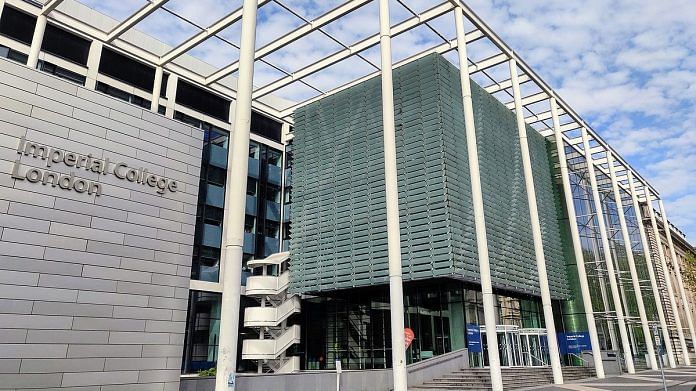New Delhi: United Kingdom’s Imperial College London is expected to shut down two of its research centres by December due to their links with Chinese aviation and aeronautics firms based out of Beijing, The Guardian claimed in an exclusive report Sunday.
“Imperial has confirmed the two centres will be shut by the end of the year after the rejection of two licence applications to the government’s Export Control Joint Unit (ECJU), which oversees the sharing of sensitive research with international partners,” journalist Hannah Devlin reported for the UK media house.
The research centres in question are the AVIC Centre for Structural Design and Manufacture and the BIAM-Imperial Centre for Materials Characterisation, Processing and Modelling – both of which were established in 2012 and have been publishing original research papers since 2014.
A collaboration between Imperial College London and subsidiaries of the Aviation Industry Corporation of China, the AVIC Centre for Structural Design and Manufacture was set up to promote research in aircraft design and manufacturing technologies.
“Their knowledge of metals, polymers and composites and experience with design, manufacture, testing and inspection combines well with Imperial’s capabilities on fundamental research…It is hoped that such collaborations will help create safer, lighter and more efficient air transportation facilities,” Imperial’s website says about the venture.
Similarly, Imperial’s partnership with the Beijing Institute of Aeronautical Materials to form the BIAM-Imperial Centre for Materials Characterisation had been focused on “fundamental research, material development, industrial application, technological and engineering research of advanced aeronautical materials”.
The centre’s projects included “modelling of solid-state lithium batteries” as a method of promoting sustainable development in the automotive and aviation industries.
The centres’ expected closure in December comes three months after former prime minister Boris Johnson’s government had attempted to crack down on investment by “foreign actors” from countries like China and Russia, according to a report by The Times.
As such, then-Minister of State for Higher and Further Education Michelle Donelan had proposed an amendment to the Higher Education (Freedom of Speech) Bill requiring UK universities “to report any financial arrangements they have with individuals or organisations overseas”, and thereby “ensure that UK values cannot be compromised”.
“We are home to some of the best universities in the world and for decades students have travelled thousands of miles across the globe to study here because of our values of free speech and academic freedom. It is right that we are taking new action to protect our universities from undue foreign influences,” The Times had quoted Donelan as saying.
The head of MI5 – UK’s national security service – had in July also issued a joint warning, along with the chief of the United States’ Federal Bureau of Investigation (FBI) about the issue of Chinese spying, alleging that China is “set on stealing your technology”, implying that the issue could also occur on UK university campuses.
Also read: China watchers are on the rise in India—from civil servants to scholars to general public



